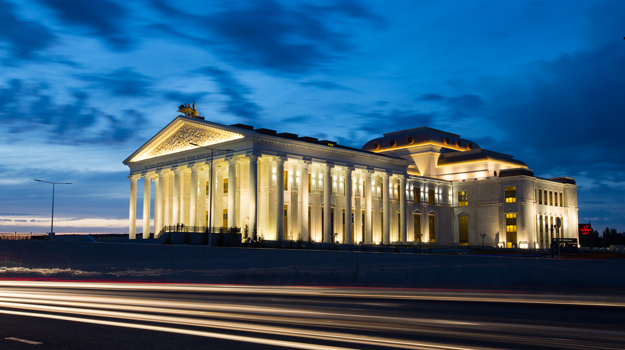ASTANA – Performances of “Spartacus” will highlight the first appearance by the Astana Opera ballet troupe at the Teatro Carlo Felice, the ancient theatre and principal opera house in Genoa, Italy. The tour, which will also include the “Gala Ballet,” will be held Jan. 21, 23, 24, 25 and 27.
 “Getting an invitation from such a famous theatre is a great honour. We are facing an important challenge to honourably represent Kazakhstan’s art to the discerning Italian viewer. We hope to gain new fans who would want to visit Kazakhstan and our theatre in particular,” said Astana Opera Ballet Art Director Tursynbek Nurkaliyev.
“Getting an invitation from such a famous theatre is a great honour. We are facing an important challenge to honourably represent Kazakhstan’s art to the discerning Italian viewer. We hope to gain new fans who would want to visit Kazakhstan and our theatre in particular,” said Astana Opera Ballet Art Director Tursynbek Nurkaliyev.
“Spartacus,” with storyline and music by Aram Khachaturian, will be staged by master choreographer Yuri Grigorovich. It is imbued with dramatic feelings, artistic images and romantic intonations.
“Spartacus” follows the exploits of the gladiator and leader of the slave revolt known as the Third Servile War, a rebellion ferociously defeated by Roman Commander Marcus Licinius Crassus in the first century B.C. Khachaturian, who composed the ballet in 1954, was awarded a Lenin Prize that year. To this day, it remains one of the most spectacular and popular with audiences.
The Astana Opera press service reports that the Italian public is looking forward to performances by Kazakh artists, with all tickets for the ballet and the gala programme already sold out. Excitement around the touring theatre is justified, as the national school of classical dance is widely acknowledged abroad.
Italian theatre Art Director Giuseppe Acquaviva also stressed that the Teatro Carlo Felice would become a window to Europe for the company. The troupe consists of 85 people and members of the Genoa Theatre Symphony Orchestra will also participate in the performances, to be conducted by Kazakhstan’s honoured worker Aidar Abzhakhanov.
The Astana Opera State Opera and Ballet Theatre was founded in 2013 at the initiative of Kazakh President Nursultan Nazarbayev. At the opening of the theatre the head of state stated, “a country which builds factories and roads creates a solid foundation for the years ahead. A country which builds schools and hospitals cares about the future of the nation for decades. A country which builds theatres looks through the centuries to the future.”
Founded in 1824, the main hall of the Teatro Carlo Felice can hold up to 2,000 patrons, while a smaller auditorium has 200 seats. The theatre, situated at the Piazza de Ferrari, was named after Duke Carlo Felice.
